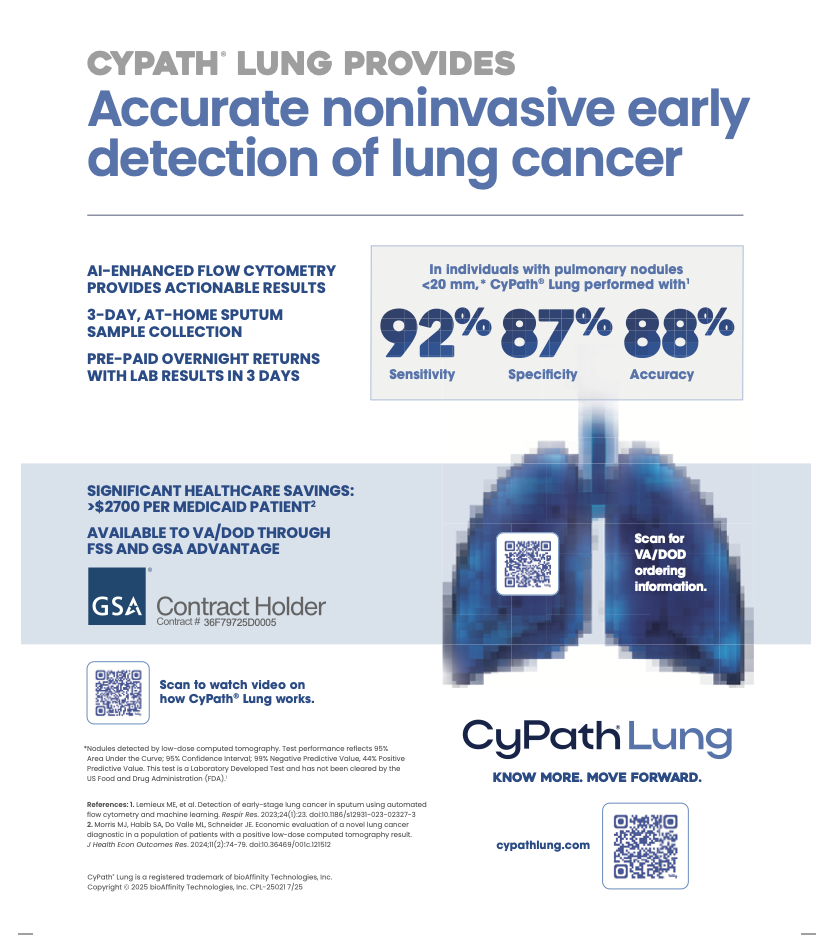OCTOBER 10, 2018
As published in the San Antonio Business Journal
By W. Scott Bailey – Senior Reporter, San Antonio Business Journal
BioAffinity Technologies, a San Antonio-based biotech, has struck a deal with another local company, Precision Pathology Services, to sell its CyPath Lung device nationally.
The arrangement furthers bioAffinity’s progress toward making its market debut with the new early-cancer detection product.
Under the licensing agreement, Precision Pathology will assist bioAffinity in the continued development of CyPath Lung technology and then launch a coast-to-coast commercialization of the product as a laboratory developed test.
The development and distribution deal comes as bioAffinity continues to conduct a validation trial of CyPath Lung. That study, which involves several test sites, is expected to be completed by early 2019, clearing the path for commercialization.
The deal with Precision Pathology was in part a result of the latter company’s familiarity with the CyPath Lung technology, bioAffinity President and CEO Maria Zannes said. Precision Pathology’s leadership, including the company’s president, Dr. Roby Joyce, assisted in the research and development of the product, Zannes said.
“The working relationship over this last year has been excellent,” she said. “Dr. Joyce and I saw a great opportunity to grow both companies.”
Joyce said CyPath Lung will provide clinicians and patients with an “accurate, affordable and noninvasive assay to confirm a lung cancer diagnosis in the early stages of the disease — when it is most treatable.”
Precision Pathology plans to market CyPath Lung to clinicians and their patients after a positive result from a low-dose computed tomography, or LDCT, screening. BioAfinnity officials said LDCT has a high false-positive rate of more than 96 percent, which can lead to invasive and expensive follow-up procedures — including PET scans, bronchoscopy and lung biopsies — to confirm a lung cancer diagnosis.
Preparing for a global launch
An estimated 14 million Americans are at high risk for lung cancer. If everyone who is at high risk is screened annually by LDCT, an estimated 4 million people would receive a positive result, but only four out of 100 of those individuals who receive a positive result would actually have lung cancer, according to the National Lung Screening Trial.
Zannes said CyPath Lung can lower the number of such unnecessary and invasive procedures.
“We believe physicians will see the benefit of a surer diagnosis, earlier disease detection and fewer unnecessary procedures for patients,” she said. “We know Precision Pathology will bring a crucial focus on patients and physician needs that can improve the commercial aspects of the test.”
The timing of the deal with Precision Pathology is ideal.
“We had planned to be in the commercial market in early 2019,” Zannes said. “Our agreement with Precision Pathology comes at the right time.”
Precision Pathology plans to market CyPath Lung nationally to major hospitals and large pulmonary and internal medicine practices, as well as to rural facilities and physicians and to smaller medical centers.
BioAffinity also plans to seek international distribution.
“The global market is definitely important to us,” Zannes said. “We will be expanding next year into the European Union and United Kingdom.”
Currently, there are 50 issued patents wholly owned by bioAffinity in 21 countries, including the U.S. It also has patent protections in the European Union, as well as in Canada, Australia, Japan, Mexico, Hong Kong and China.
There are three additional patent applications pending and several more being drafted, said Zannes, who noted that Emergo, an Austin-based firm, is helping bioAffinity deal with regulations in foreign markets.
“We will be partnering with strategic firms in the commercialization of CyPath Lung overseas,” she said, adding that one of the company’s primary international targets is China because it is considered the “world’s largest market in terms of lung cancer diagnosis.”

